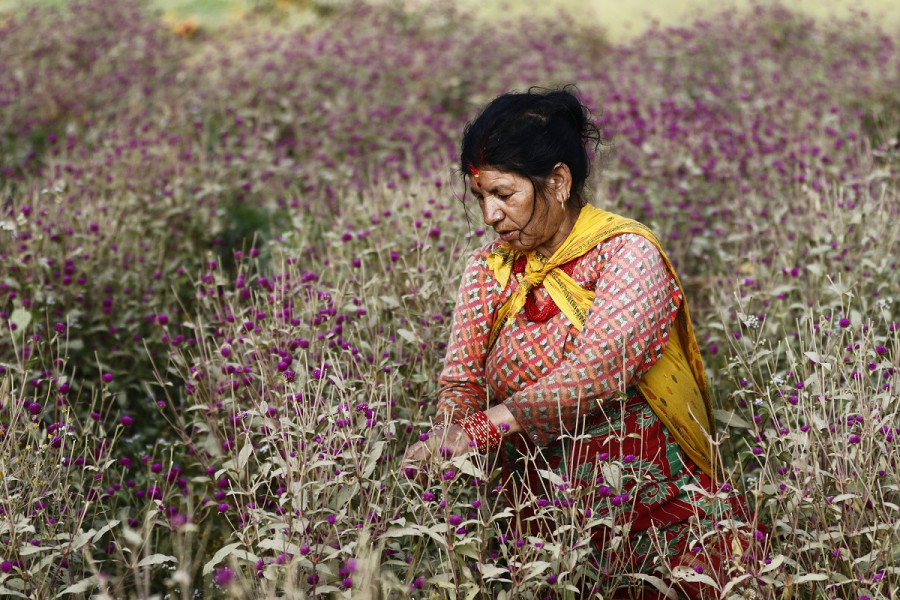Money
Covid-19 pandemic hits floriculture hard
Floriculture Association Nepal says businesses lost Rs750 million due to the pandemic.
Anup Ojha
Meena Thapa used to plant makhamali flowers three months before Tihar on her leased land in Gundu, Bhaktapur. But this year she didn’t do so.
“I didn’t grow flowers this year thinking that they would not be sold in the market,” said Thapa, 35, mother of two.
Few of those who grew makhamali flowers (globe amaranth) in Gundu to sell in Tihar are also worried about taking their produce to Kathmandu as the city grapples with the Covid-19 pandemic.
Makhamali flowers are in high demand during Tihar, particularly on the day of Bhai Tika. The demand only goes up once the festival starts.
“In the past, people would come house to house to look for flowers. We also used to go to Kathmandu with flowers when Tihar started, but it’s too risky to go there now,” said Harimaya Basnet, 43 of Dokathali-7.
Farmers such as Basnet Thapa would go to Koteshwor, New Baneshwor, Ason, Indra Chowk and Kalimati neighbourhoods in Kathmandu to sell flowers for Tihar. But this year, they aren’t doing so.
According to Rabindra Sapkota, chairman of Ward No.7, before the pandemic, Gundu alone would supply garlands worth Rs50 million to Kathmandu.
“But this time, many didn’t grow flowers and those who harvested them are also facing difficulties selling them,” said Sapkota. Gundu village has become synonymous with makhamali flowers, and last year nearly 700 farmers, most of them women, were involved in growing the flower.
“Those women who were growing flowers had become self-reliant selling makhamali. But this year has brought bad luck for them,” said Sapkota. He said each household would earn a minimum Rs 50,000 selling flowers.
The Covid-19 pandemic and the nationwide lockdown that started from March 24 has not only affected people in Gundu, but also other floriculture pockets in Bhaktapur such as Tathali, Sudal, Sipadole and Nakhel.
Rameshwor Bashi, 44, of Changunarayan-9, who has been in the floriculture business for the past five years said he is staring at losses.
“I started this business after working abroad for 13 years. But this year was the worst. Though we have produced makhamali flowers for Tihar, flowers from India have replaced our produce,” said Bashi, the owner of Everest Floriculture and Vegetable Farm.
“Gundu was a booming pocket for makhmali, but due to the Covid-19 pandemic, all flaurachulterists, including those who plant makhamali and sayapatri are depressed,” said Kumar Kashaju Shrestha, president of Floriculture Association Nepal.
“It’s because of the six months of lockdown that people didn’t plant flowers as everything was closed,” said Shrestha. He said the sector is looking at losses of Rs 750 million this year.
Due to the pandemic, marriage ceremonies and other public gatherings where flowers would be used in large volumes have been cancelled. Hotels and airports which use flowers to welcome guests have also remained closed.
“Those were the places where flowers would be consumed. As the country was also set to celebrate Visit Nepal 2020, we were looking at a good business year ,” said Shrestha.
The association's data shows that floriculture businesses across the country earned Rs242 million last year.
“Our target was to cross the Rs300 million figure this year. But that sounds far-fetched now,” said Shrestha.
Although farmers are going through difficult times due to the Covid -19 pandemic, the government role has been limited to a mute spectator, farmers allege.
Hari Bahadur KC, spokesperson for the Ministry of Agriculture, said he is not aware of the problems faced by floriculture businesses. “Representatives from the agriculture association told us that we are self-sufficient in flowers,” said KC.




 9.83°C Kathmandu
9.83°C Kathmandu.jpg)















